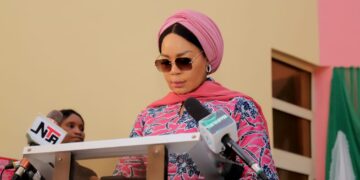Processed nearly 1,000 title applications, with hundreds of licenses approved
The Minister of Solid Minerals Development, Dr Dele Alake, yesterday reiterated that the reforms being carried out by the Bola Tinubu administration in the Solid Minerals Development sector, yielded N6.96 billion in terms of collections of mining licence fees in the first quarter of 2025.
The minister, who spoke at the ongoing Organisation for Economic Cooperation and Development (OECD) Forum tagged: “ Better Policies for Better Lives”, in Paris, France at the weekend, argued that the reforms had begun to yield the expected results.
In a statement signed by the Special Assistant on Media to the Minister, Segun Tomori, the minister also noted that the Mining Cadastral Office also processed nearly 1,000 title applications, with hundreds of licenses approved to accelerate responsible development in the country during the period.
“These reforms are already delivering results. In the first quarter of 2025 alone, Nigeria generated N6.96 billion in mining license fees, formalised over 1,200 artisanal and small-scale mining cooperatives, and registered 118 private mineral buying centers,” he added.
Alake also highlighted Africa’s strategic importance in the global energy transition, noting the continent’s growing share in the global supply of critical minerals such as cobalt, lithium, copper, and tantalum.
The minister called for a paradigm shift from Africa, from being mere exporters of raw materials to becoming leaders in value-added processing and high- value mineral supply chains.
“As Chair of the Africa Mineral Strategy Group (AMSG), I work closely with my counterparts across the continent to advance a shared agenda of value addition, resource mobilisation, and responsible development,” he affirmed.
“Our focus is clear-unlocking inclusive growth from Africa’s vast mineral wealth,” the minister explained.
Reiterating the need for cooperation, Alake stressed that building resilient, transparent, and ethical mineral supply chains requires multi-stakeholder collaboration between governments, the private sector, civil society, and local communities.
“Nigeria is ready to work with global partners to promote responsible sourcing, encourage beneficiation, and deliver long-term economic value,” he stressed.
With the emergence of the global energy transition, Alake argued that there has never been a more critical moment for decisive leadership.
“The future of electricity, transportation, telecommunications, and indeed global prosperity depends on the work we do here. Let us embrace this opportunity-not just to discuss change, but to drive it,” he said.
Alake underscored the importance of global partnerships in building a resilient and sustainable mining sector, highlighting the critical role of mining in the global shift toward greener energy.
He emphasised the need for smarter site selection, optimised operations, sustainable processing, waste management, and environmental stewardship as a responsibility owed to future generations-not merely a policy aspiration.
The minister outlined Nigeria’s proactive steps to attract investment into its solid minerals sector, citing investor-friendly incentives such as import duty waivers, accelerated capital allowances, and tax holidays.
He stressed that these incentives are being implemented alongside robust reforms that prioritise sustainable extraction, domestic processing, and enhanced infrastructure connectivity.









































Discussion about this post